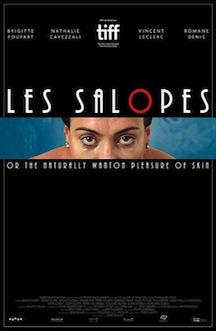Directed by Renée Beaulieu
Country: Canada
It’s widely known that every person’s skin reacts differently to touch, pressure, temperature, levels of stress, and several other external factors. But what the main character of “The Naturally Wanton Pleasure of Skin” tries to understand is how disparately the skin cells react to love and desire in a close linkage of dermatology and sexuality. For that, Marie-Claire (Brigitte Poupart), a down-to-earth, well-established scientist and university teacher, uses her own body and several male guinea pigs in what she calls ‘experiments’. These include sexual intercourse, which she practices without any preconception or guilt, despite being happily married and mother of two.
In truth, Marie-Claire is a pleasure-seeker, who uses her ongoing research as an excuse to feed intense carnal appetites. Soon, it became an addiction. So, it’s not uncommon to see her embarking on a wild sexual activity with a complete stranger; a fellow scientist, Alexandre (Normand D'Amour), head of her department; or even a literature doctorate, Emile (Pierre Kwenders), who is 20 years younger and makes sure to attend her classes. Men simply love her type: carefree, independent, unpossessive, wanton.
Adam (Vincent Leclerc), her husband, is often traveling and had agreed to an open relationship, but things go astray when she casually opens up about her secret life. Gradually, her fully open smile is swallowed by preoccupation, to which further contributes the delicate situation of her vulnerable 14-year-old daughter, Katou (Romane Denis). It’s not that Marie-Claire doesn’t care for her. She’s just tremendously inattentive, being too immersed in her thing. When the situation is barely out of hand, is her mother - another hedonist - and her volatile, depressed, and eternal unsatisfied best friend, Mathilde (Nathalie Cavezzali), who stand on her side.
The complexities rendered by Renée Beaulieu in her second feature drama do not always succeed, but, as a character study, the film poses some interesting points of view regarding family and happiness, love and desire, as well as men and women with their commonly associated roles of predators and victims, respectively.
The reappearance of mechanical procedures and an invariable tone in each human contact may difficult the viewer’s engagement, limiting the curiosity about this woman’s behavior. Nevertheless, things improve a bit in the second half, when the affective facet overcomes the libidinous.
One of the strongest aspects of the film, in addition to Poupart’s performance, is the score by David Thomas, whose mixture of ominous textures, expert beats, and occasional ethereal chants, compensate the prosaic sex scenes with sync commitment.



